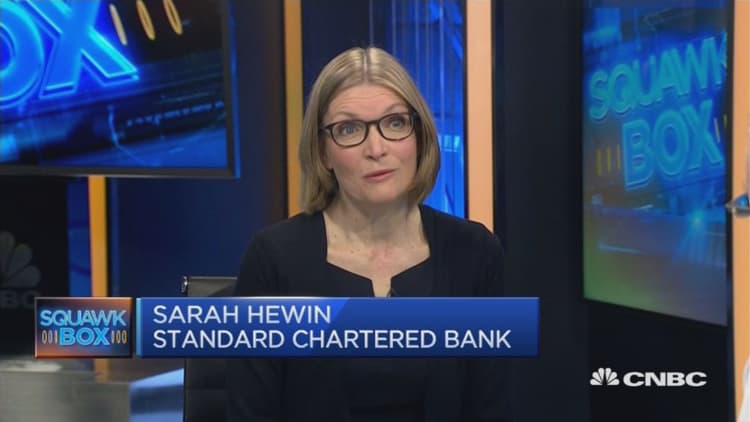For all the concerns about the EU breaking apart, analysts say the euro should eventually strengthen as the trade bloc solidifies economically and politically.
"The EUR is close to a turning point, amid accelerating inflation and stronger economic data," Andres Jaime, global FX and rates strategist at Barclays, said in an email. Although many threats still exist, he said the currency is likely on the upswing after "excessive pricing of political risk for 2017."
Jaime expects the euro to dip at the end of this year to $1.03 before recovering to $1.05 by the first quarter of next year.
Euro-USD 12-month performance

On the economic front, the real GDP for the European Union grew 1.9 percent last year, according to eurostat . Many analysts also expect that later this year the European Central Bank will begin tapering, or reducing its stimulative quantitative easing program, due to the improving economy.
"While Le Pen is polling well for now, we are not anticipating her winning the second stage," Carl Forcheski, director of corporate FX sales at Societe Generale, said in an email. "Longer term, toward the second half of 2017, our econ research staff sees a good chance the euro firms, due to its massive undervaluation, structural surpluses and a market yet to price in an ECB tapering."
Populist voices in Europe have grown, and last June the U.K. vote to leave the EU surprised markets and the pound dropped to a more than 30-year low against the dollar.
Jitters over the French election did hit the market overnight after a new poll showed Communist-backed candidate Jean-Luc Melenchon gaining some ground. The euro dipped to a one-month low of $1.0568 before recovering to near $1.060.
Such near-term volatility is part of some analysts' forecasts.
"We see it weakening to 1.02 by June, to some extent because of risks related to the U.S. elections and some progress on U.S. tax reform. Then, we have it going back to 1.05 by year-end and 1.10 next year, as the ECB tapers QE," Athanasios Vamvakidis, head of G-10 FX strategy in Europe for Bank of America Merrill Lynch, said in an email.
To be sure, after market surprises like Brexit and U.S. President Donald Trump's election win, caution in forecasting political events is doubly warranted.
"Nobody can predict the outcome," noted French writer and philosopher Bernard-Henri Levy told CNBC in an interview last month. "In a way, Le Pen already won a lot because she dictated part of the terms of the public conversation."
"Common currency means common politics," he said. "If there is not in the coming years a significant political jump forward, euro will not survive. Euro will collapse."


